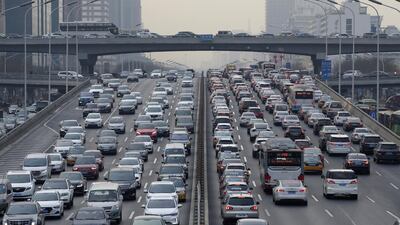Japan's Panasonic cut its annual profit outlook after disappointing quarterly earnings it blamed on a slowing Chinese economy hit by a trade war with the United States that hurt demand for auto components and factory equipment.
Panasonic forecast an operating profit of ¥385 billion (Dh12.89bn) for the year ending March, down from the previously predicted ¥425bn and missing the ¥420.25bn average of 18 analyst estimates polled by Refinitiv.
"Demand for mechatronics, mostly motors, has plunged since November as our clients making equipment for smartphone factories cut their investment," said Panasonic chief financial officer Hirokazu Umeda.
China's shrinking car market has crimped demand for automotive components, Panasonic said, while sales have also dropped for electronic devices used in air conditioners.
Panasonic's operating profit for the October-December quarter fell 19 per cent to ¥97.6bn, far below the average ¥122.35bn estimate of eight analysts.
The energy division, which includes its battery business with US electric car maker Tesla, provided some good news in a bleak quarter, posting its first operating profit in three quarters. In Tokyo, Panasonic closed up 0.85 per cent at ¥1,061 ahead of its third quarter earnings report.
"Sales and profit at the Tesla business have improved," Mr Umeda said of the division's ¥16.5bn operating profit.
He said additional lines at Tesla's "Gigafactory" battery plant in Nevada would be installed by the end of March, bringing the plant's total capacity to the 35 gigawatt hours (GWh).
Panasonic, the exclusive battery cell supplier for Tesla's current production models, saw its profits squeezed early last year by the US EV maker's initial production delays for the mass-market Model 3 saloon.
Tesla expressed optimism last month that it would post profits in every quarter in 2019, but the winding down of a US tax subsidy this year is expected to make Tesla cars more expensive and could hurt sales.
At the briefing, Mr Umeda said a decision had not been taken yet on how Panasonic would supply battery cells for Tesla's new Shanghai car factory, Reuters reported. Tesla has been in discussions with other suppliers, including China's Tianjin Lishen.
"We have production sites for cylindrical batteries in the United States, Japan and China," Mr Umeda said. "We are in the process of analysing where would be the best to supply batteries."
His comments come as Model 3 owners in the US have taken to social media and online forums to air issues they’ve had with their saloons due to the frigid weather of the past week. Cold conditions are a drain on battery range, no matter the car brand. But other predicaments are particular to Tesla.
Ronak Patel, a CPA auditor in New Jersey, bought a Model 3 last August. He’s driven about 150 miles in the cold over the past few days. “My biggest concern is the cold weather drained my battery 20 to 25 miles overnight and an extra five to ten miles on my drive to work,” he said. “I paid $60,000 to not drain my battery so quickly.”
Tesla isn’t alone in facing this flaw.
“It’s Panasonic that manufactures Tesla batteries,” said Salim Morsy, an analyst with Bloomberg New Energy Finance. “It’s not something specific to Tesla. It happens to Chevy with the Bolt and Nissan with the Leaf.”
To reduce its heavy reliance on Tesla, Panasonic has teamed up with Toyota Motor to jointly develop and produce thin, rectangular-shaped prismatic batteries, a type different from the cylindrical batteries used in Tesla EVs.
Panasonic plans to supply prismatic batteries to its existing customers such as Honda through the Toyota joint venture.
"We are aiming to develop the best batteries in the industry that would be wanted by a wide range of car makers," Mr Umeda said.

